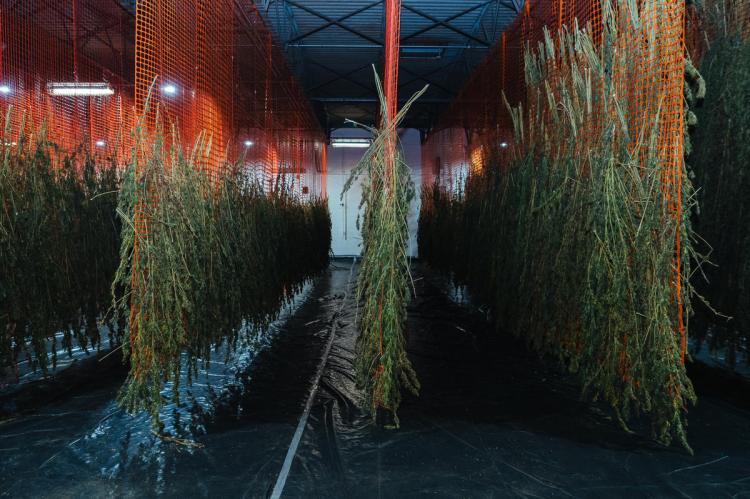Ohio Farmers Planning To Grow Hemp Can Learn From Pennsylvania
“It's a learning curve for everyone … and I think it's important for all farmers to work together to benefit each other and offer all our services each other."
Image Source: JARED MURPHY / WESA
At AgraPharm LLC’s warehouse in Beaver County, Pennsylvania, the scent of cannabis is potent.
“What you're smelling today is about only a third of what it really smells like when we first harvest the crop,” said AgraPharm’s CEO Ed Santillan.
The hemp drying inside was harvested in October. There are rows and rows of it, stalks as big as eight feet long, hanging from orange plastic netting secured to the ceiling.
It smells just like marijuana, but there’s one big difference: This hemp has much less THC, the psychoactive ingredient in weed that makes a user feel high.
“We have less than 0.3% THC in our product, versus your standard medical marijuana having anywhere from 15-40% THC,” said John Clay, AgraPharm's chief operating officer.
Ohio farmers will start growing industrial hemp next year, after the latest “Farm Bill” legalized the plant on the federal level. States can now craft their own rules for hemp, which used in everything from herbal supplements to biodegradable plastics, and Ohio this year finally gave farmers the green light.
As the first season approaches, growers looking for advice can turn to Pennsylvania, which just wrapped up its first hemp-growing season in more than 80 years.
When Clay reaches out to one of the stalks, the tight, dry bud crumbles between his fingers, and seeds fall to the ground. Soon the seeds will be swept up, processed and cleaned. There are three large seed tables in the warehouse – basically wooden boxes on legs – and they’re filled with the processed seeds, each about the size of a peppercorn.
“We have approximately 250 pounds of seed in here,” Clay said, reaching into the box and scooping up a handful of the little brown seeds. “This basically is shed off of these plants, and we haven't even broken the plants down. So we'll expect to have probably a couple of thousand pounds by the time we're done.”
All told, they’ll produce millions of seeds by the end of this growing season. Clay said they won’t have any problem finding buyers for them. There was a seed shortage this year and next year demand could be even higher as industrial hemp programs get going in large states like Texas and Florida.
AgraPharm is one of more than 300 companies and individuals licensed by the state of Pennsylvania to grow hemp this year. Growing for seed wasn’t actually AgraPharm’s plan for this inaugural season. Initially, they hoped to grow a seedless strain of hemp, to be processed into CBD products.
John Clay is the chief operating officer at AgraPharm. He splits his time between Pennsylvania and Maine, where he farms blueberries.Credit Jared Murphy / WESAEdit | Remove
"Because of the heavy rain [in the spring] and the late planting, we switched our strategy to plant mainly for seed, which is a double benefit," said chief engineering officer Eric Mattmuller. "There's a very strong market for seed this year and we have plenty of seed crop for next year as well."
Adaptability is key to survival in this business, said Santillan.
“We've talked to several farmers who have had total losses of their crop,” he said. “It's a learning curve for everyone … and I think it's important for all farmers to work together to benefit each other and offer all our services each other.”
Santillan has big plans for the business. He wants AgraPharm to one day be vertically integrated, from producing the seeds, to growing and drying the hemp, to extracting the CBD. And he wants to make those services available to other hemp farmers.
He’s also in talks with people in Ohio, West Virginia and Maine about partnering to grow hemp in those states.
Santillan, who also works as a lawyer, said he’s plowed about $500,000 into the venture so far. But he said his business is about more than turning a profit. He said the hemp industry will bring jobs to rural areas like Beaver County, and the products they create have the potential to make life better for people like his wife, who has found that CBD oil reduces her migraine symptoms.
It’s a new era, he said.
“It's exciting,” Santillan said. “This is the first year that hemp is allowed to be grown as a result of the [2018] Farm Act and - everyone that's involved this year has been part of history in the making.”
Authored by: Liz Reid, WOSU
- Log in to post comments

